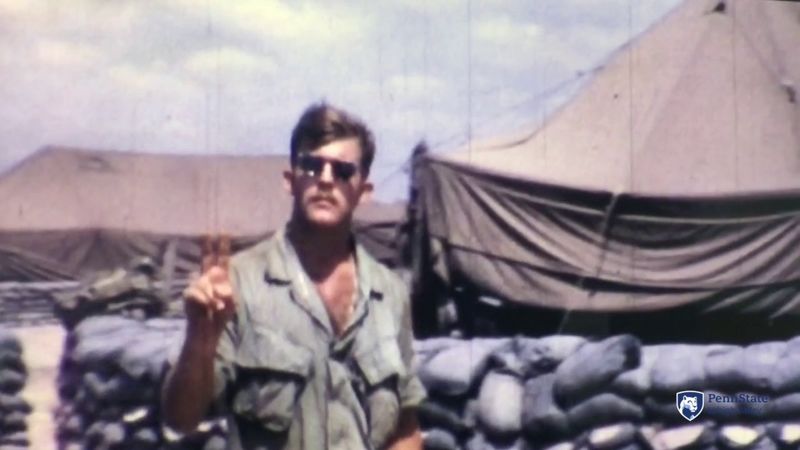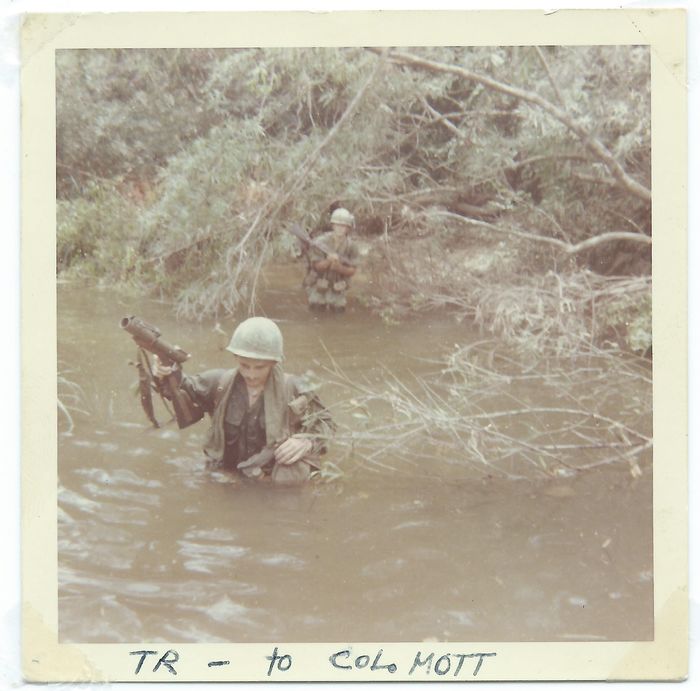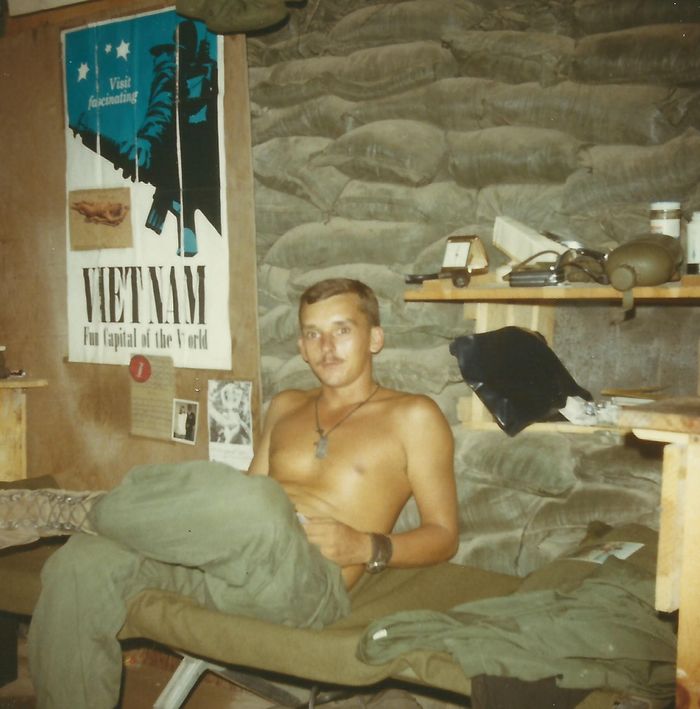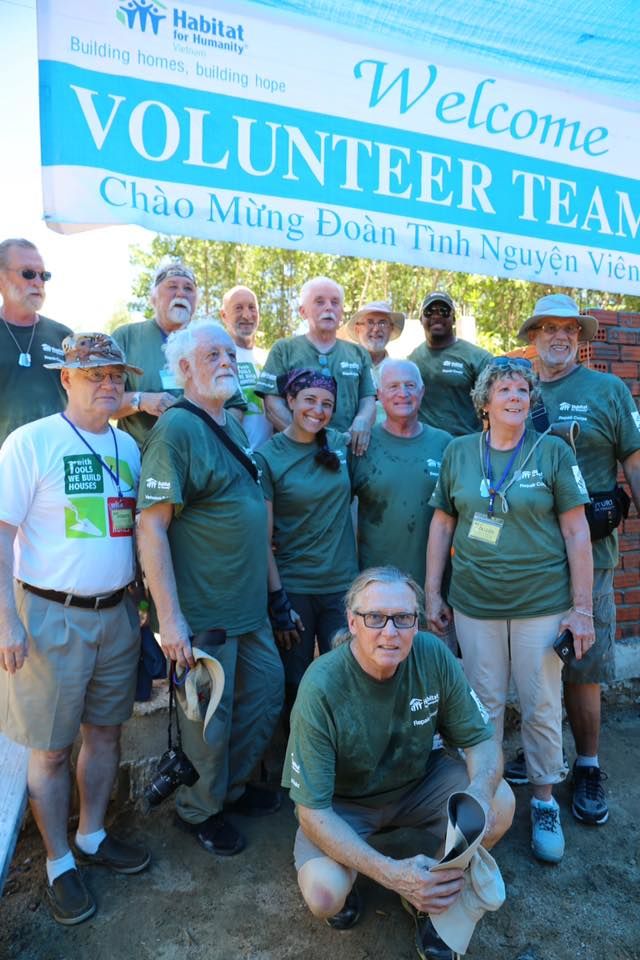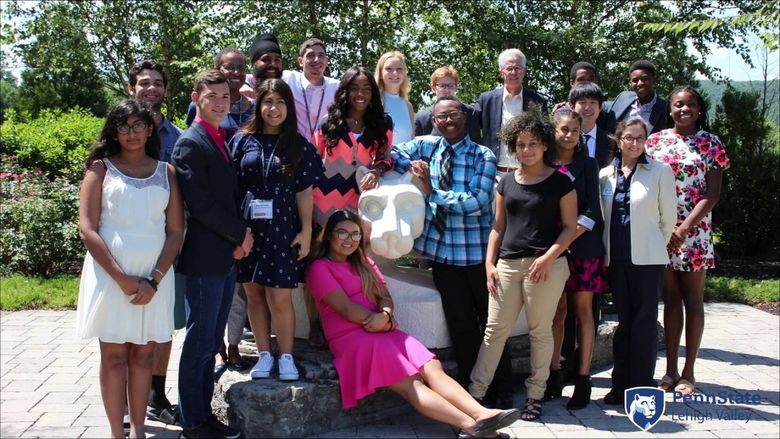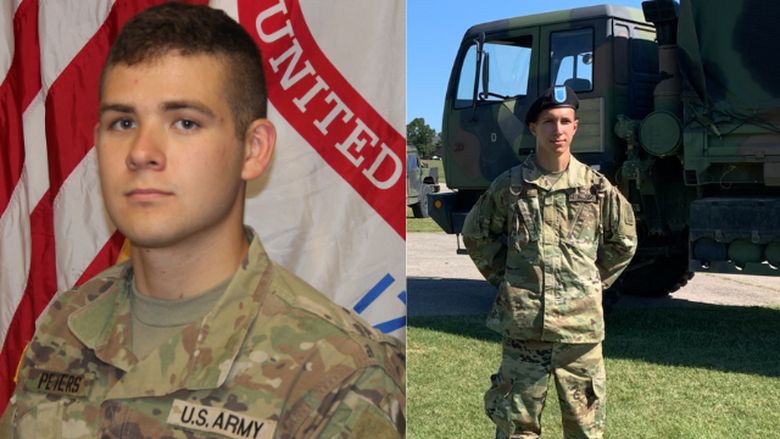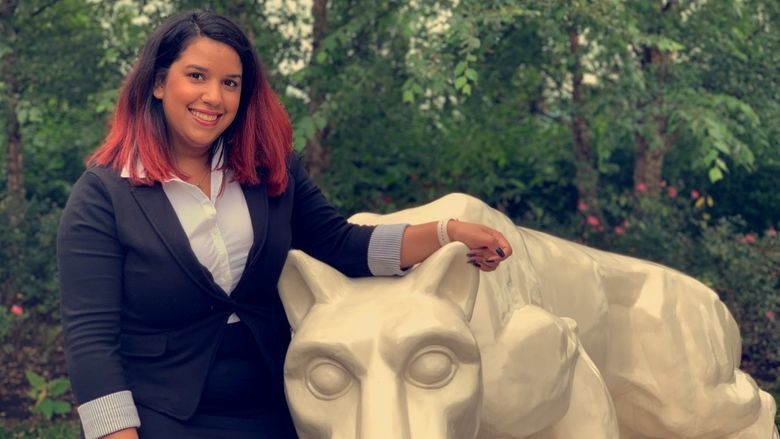Tom Roney reviewed his photo albums from his time serving in the Army during the Vietnam War while visiting the Penn State Lehigh Valley library.
CENTER VALLEY, Pa. — Tom Roney, of Bethlehem, Pennsylvania, has many passions in life: spending time with his family, volunteering with Habitat for Humanity, and celebrating his fellow Vietnam veterans — and dispelling myths about them.
This devotion to spreading the truth about his experiences in Vietnam drew Roney to participate in Penn State Lehigh Valley’s Vietnam Oral History Project.
“The goal of the oral history project at Penn State Lehigh Valley is to preserve the legacies of some of the soldiers who proudly and bravely served our country during the controversial Vietnam War,” said Dennis Phillips, head campus librarian.
After learning about a similar project occurring at University Park, Phillips approached Liz Keptner, director of Penn State Lehigh Valley’s Multimedia Innovation Center (MIC), and Amber Campbell, MIC videographer and editor, to see if they would be willing to work on a project at Lehigh Valley. Both quickly jumped on board to help get it off the ground.
To date, five local veterans have been interviewed, and their videotapes and printed transcriptions have been added to the Penn State University Libraries Archives. The veterans include Roney; Emory Guffrovich, of Pittston; Peter Christensen, of Allentown; Sherry Kondrosky, of Perkasie; and Colleen Hauser, of Easton. Under the guidance and direction of Phillips and Keptner, students produced the project.
“While I could have done the interviews myself based on my background," said Keptner, "I wanted students to be able to ask the veterans these questions, and more importantly, listen to their answers. I felt it was important to utilize MIC students who had a military background.
“Sometimes we forget about these events and what these people sacrificed. Some soldiers came back home from Vietnam and they were not welcomed. They were turned down from jobs because they fought, or faced other adversities. I think it is important that they share their stories and students can hear them so we keep these memories alive.”
Penn State Lehigh Valley student veterans Brandon Ward, a junior journalism major, and Justin Honer, a sophomore information sciences and technology major, served as the interviewers. Kyle McCoach, a junior arts administration major, handled the technical aspects.
“We have now created primary source material for our students involved in studying the Vietnam War to consult when doing their assignments and course projects," said Phillips. "It brings everything together for our students and provides engaged scholarship experience for the students who interviewed the veterans."
Roney has been friends with Kermit Burley, instructor in information science and technology (IST) and the coordinator of the IST degree program at Penn State Lehigh Valley, since 1983. Burley recommended Roney be one of the veterans interviewed for the project.
Army veteran Roney was eager to share his story with the students. He acknowledged there traditionally has been a serious perception issue with Vietnam veterans, and he wants a balanced story told.
“There are plenty of people who think the Vietnam War may have been a mistake, but don’t tell the people who served there that they are the mistake, especially since many of us didn’t choose it,” said Roney. “We are a dying breed. More than 2 million people served and only about 700,000 are still alive. I don’t want people to forget that more than 58,000 people died in Vietnam and many were very young; 33,103 of them were only 18 years old.”
It was 1967. Roney had spent the year working and had also just applied to go back to college after dropping out. He received his college acceptance letter to the University of Buffalo the same day that his draft notice arrived. He was 20 years old.
Roney started his two-year commitment with basic training in Fort Dix, New Jersey, before heading to Fort Polk, Louisiana, to train for the infantry. He then got a two-week break to go home before shipping out to Vietnam.
“I was part of the boots on the ground,” said Roney. “I arrived in Vietnam for my 12 months of duty shortly after the Tet Offensive in 1968. They were sending a lot of people in to fight then, which is why they had to replace everyone. My goal was to stay alive and keep the guys around me alive.”
Roney recalled the interesting dynamic between the soldiers:
“When you landed you had 363 days left on your tour because of the travel time. And everyone was counting the days backwards. ‘How short are you?’ was the standard question. You didn’t want to be asked when you still had 300 or so days left. I remember it was a big deal when you became a ‘double digit midget,’ which is when you only had 99 days or less to serve in Vietnam.”
While serving, Roney was assigned to an airborne unit. He wound up getting dysentery twice. The second time he developed an abscess on his liver, and after being treated at a hospital in Saigon for three weeks, he was transferred to a hospital in Japan for two more months to recover. Even though he was very sick, he viewed it as a sort of blessing because his 12-month timeline was still ticking while he was in the hospital. This meant he was safe, and that much closer to going home when discharged from the hospital.
When Roney came home to the U.S., he said that it was not his experience to be spit on and not welcomed, but he knows of other veterans who did experience that sort of behavior and reaction from people.
Today, he is very active with the Vietnam Veterans of America Chapter 415 in the Lehigh Valley.
“For the longest time guys would sit around and moan about things, but that isn’t going to change anyone’s minds about Vietnam veterans. We need to be active and do some good,” said Roney. “We have been doing a Stand Down every other month where we veterans work with a local church group and feed the homeless. During these events, people who are struggling can come get a hot meal, get some toiletries and get a haircut.”
Roney also started volunteering with Habitat for Humanity when he retired at the end of 2012. One of his daughters had traveled to Ghana to build for a Habitat for Humanity Global Village volunteer trip and she knew of a build coming up in August 2013 in Vietnam, so she asked her father if he was interested in joining her.
“I knew a lot of Vietnam vets who were still angry and didn’t want to talk about their experience. They have so much hate, but why? I thought this trip would be a good way to make amends,” said Roney. “In 1968, my job was to blow things up and destroy things and now in 2013, I had a chance to build something.”
The woman for whom they built a home was actually injured in a bombing attack during the war. Roney described his experience of being able to help a disadvantaged family in Vietnam 44 years after he fought a war there as very cathartic.
“Serving in Vietnam was a life-altering experience that I wish everyone could go through at 18-20 years old, but then again, I wouldn’t wish it on anybody either,” said Roney.
Eventually the plan is to add Roney’s interview and the interviews of the four other veterans who participated in the project to the Library of Congress American Folklife Center’s Veterans History Project in Washington, D.C.
“It has been cathartic for the people who have decided to participate in our program, to sit down and talk about it in an academic setting, knowing that their experiences will be documented and made available to Penn State and to libraries around the country, and to the public who have access to our archives collection,” said Phillips.
To watch the four other interviews, visit the Vietnam Veteran Oral History Project YouTube page.
Dennille Schuler
Public Relations Specialist
Penn State Lehigh Valley
